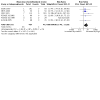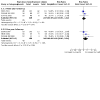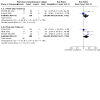High dose chemotherapy and autologous bone marrow or stem cell transplantation versus conventional chemotherapy for women with metastatic breast cancer
- PMID: 16034887
- PMCID: PMC8127573
- DOI: 10.1002/14651858.CD003142.pub2
High dose chemotherapy and autologous bone marrow or stem cell transplantation versus conventional chemotherapy for women with metastatic breast cancer
Abstract
Background: There is a hypothesis that high dose chemotherapy with autologous bone marrow or peripheral stem cell transplantation (autograft) may improve survival for women with metastatic breast cancer.
Objectives: To compare the effectiveness of high dose chemotherapy and autologous bone marrow or stem cell transplantation with conventional chemotherapy for women with metastatic breast cancer.
Search strategy: We used the Cochrane Breast Cancer Group search strategy, adding these terms: bone marrow transplantation, stem cell transplantation, autologous stem cell support. The following databases were searched: MEDLINE (until November 2004), EMBASE (until November 2004), ASCO (American Society of Clinical Oncology) (1995-2004) and the COCHRANE LIBRARY (Issue 4 2004). We searched the Cochrane Breast Cancer Group database and cooperative research groups' websites for unpublished trials.
Selection criteria: Randomised controlled trials comparing the effectiveness of high dose chemotherapy and autograft with conventional chemotherapy for women with metastatic breast cancer. Studies included one or more of the following outcomes: treatment related mortality, overall or progression-free survival at 1, 2, 3, 5 or 7 years, morbidity, quality of life measures, time to tumour progression, overall survival time.
Data collection and analysis: Six randomised controlled trials met the inclusion criteria. Two independent reviewers extracted data.
Main results: In total 438 eligible women were randomised to receive high dose chemotherapy with autograft and 412 were randomised to receive conventional treatment. There were fifteen treatment-related deaths among the high dose group and two in the control (conventional dose) group (RR 4.07 (95% CI 1.39, 11.88)). There was no statistically significant difference in overall survival between the high dose and control groups at one year, three years or five years. At one and five years of follow up, there was a statistically significant difference in event-free survival, favouring the high dose group (one year: RR 1.76 (95% CI 1.40, 2.21); five years: RR 2.84 (95% CI 1.07, 7.50). Toxicity was more severe in the high dose group. Only one of the trials has followed up all women for five years and further data are awaited.
Authors' conclusions: Although there is statistically significant evidence that high dose chemotherapy and autograft improves event free survival compared to conventional chemotherapy, there is no statistically significant evidence of benefit in overall survival for women with metastatic breast cancer. High dose chemotherapy with bone marrow or stem cell transplantation should not be given to women with metastatic breast cancer outside of clinical trials.
Conflict of interest statement
Russell Basser is the principal investigator of a trial of high dose chemotherapy with autologous bone marrow transplantation in women with non‐metastatic breast cancer, (IBCSG Trial 15). He has previously served as a consultant for AstraZeneca, Pharmacia, Wyeth, Amrad, Amgen, Novartis, Flauding and BMS.
Figures



Update of
-
High dose chemotherapy and autologous bone marrow or stem cell transplantation versus conventional chemotherapy for women with metastatic breast cancer.Cochrane Database Syst Rev. 2003;(1):CD003142. doi: 10.1002/14651858.CD003142. Cochrane Database Syst Rev. 2003. Update in: Cochrane Database Syst Rev. 2005 Jul 20;(3):CD003142. doi: 10.1002/14651858.CD003142.pub2. PMID: 12535458 Updated.
Similar articles
-
High dose chemotherapy and autologous bone marrow or stem cell transplantation versus conventional chemotherapy for women with metastatic breast cancer.Cochrane Database Syst Rev. 2003;(1):CD003142. doi: 10.1002/14651858.CD003142. Cochrane Database Syst Rev. 2003. Update in: Cochrane Database Syst Rev. 2005 Jul 20;(3):CD003142. doi: 10.1002/14651858.CD003142.pub2. PMID: 12535458 Updated.
-
High dose chemotherapy and autologous bone marrow or stem cell transplantation versus conventional chemotherapy for women with early poor prognosis breast cancer.Cochrane Database Syst Rev. 2003;(1):CD003139. doi: 10.1002/14651858.CD003139. Cochrane Database Syst Rev. 2003. Update in: Cochrane Database Syst Rev. 2005 Jul 20;(3):CD003139. doi: 10.1002/14651858.CD003139.pub2. PMID: 12535457 Updated.
-
High dose chemotherapy and autologous bone marrow or stem cell transplantation versus conventional chemotherapy for women with early poor prognosis breast cancer.Cochrane Database Syst Rev. 2005 Jul 20;(3):CD003139. doi: 10.1002/14651858.CD003139.pub2. Cochrane Database Syst Rev. 2005. Update in: Cochrane Database Syst Rev. 2016 May 20;(5):CD003139. doi: 10.1002/14651858.CD003139.pub3. PMID: 16034886 Updated.
-
High-dose chemotherapy and autologous bone marrow or stem cell transplantation versus conventional chemotherapy for women with early poor prognosis breast cancer.Cochrane Database Syst Rev. 2016 May 20;2016(5):CD003139. doi: 10.1002/14651858.CD003139.pub3. Cochrane Database Syst Rev. 2016. PMID: 27200512 Free PMC article.
-
High-dose chemotherapy followed by autologous haematopoietic cell transplantation for children, adolescents, and young adults with primary metastatic Ewing sarcoma.Cochrane Database Syst Rev. 2021 Sep 2;9(9):CD011405. doi: 10.1002/14651858.CD011405.pub2. Cochrane Database Syst Rev. 2021. PMID: 34472082 Free PMC article.
Cited by
-
International guidelines for management of metastatic breast cancer: can metastatic breast cancer be cured?J Natl Cancer Inst. 2010 Apr 7;102(7):456-63. doi: 10.1093/jnci/djq029. Epub 2010 Mar 10. J Natl Cancer Inst. 2010. PMID: 20220104 Free PMC article. Review.
-
Treatment strategy for metastatic breast cancer according to intrinsic subtype.Int J Clin Oncol. 2010 Aug;15(4):333-4. doi: 10.1007/s10147-010-0102-5. Epub 2010 Jul 15. Int J Clin Oncol. 2010. PMID: 20632058 No abstract available.
-
Genetic heterogeneity in breast cancer: the road to personalized medicine?BMC Med. 2013 Jun 18;11:151. doi: 10.1186/1741-7015-11-151. BMC Med. 2013. PMID: 23800221 Free PMC article. Review.
-
Interdisciplinary GoR level III Guidelines for the Diagnosis, Therapy and Follow-up Care of Breast Cancer: Short version - AWMF Registry No.: 032-045OL AWMF-Register-Nummer: 032-045OL - Kurzversion 3.0, Juli 2012.Geburtshilfe Frauenheilkd. 2013 Jun;73(6):556-583. doi: 10.1055/s-0032-1328689. Geburtshilfe Frauenheilkd. 2013. PMID: 24771925 Free PMC article. No abstract available.
-
High-dose chemotherapy with autologous hematopoietic stem-cell transplantation in metastatic breast cancer: overview of six randomized trials.J Clin Oncol. 2011 Aug 20;29(24):3224-31. doi: 10.1200/JCO.2010.32.5936. Epub 2011 Jul 18. J Clin Oncol. 2011. PMID: 21768454 Free PMC article.
References
References to studies included in this review
ECOG 2000 {published data only}
-
- Daly MB, Goldstein LJ, Topolsky D, Klumpp T, Ross E, Gillespie D, et al. Quality of life experience in women randomised to high-dose chemotherapy and stem cell support or standard dose chemotherapy for responding metastatic breast cancer in Philadelphia Intergroup Study (PBT-1). In: Proceedings of the American Society of Clinical Oncology (ASCO). Vol. 327. 2000.
-
- Stadmauer EA, O'Neill A, Goldstein LJ, Crilley PA, Mangan KF, Ingle JN, et al. Conventional-dose chemotherapy compared with high dose chemotherapy (HDC) plus autologous stem-cell transplantation (SCT) for metastatic breast cancer: 5-year update of the Philadelphia Trial (PBT-1). In: Proceedings of the American Society of Clinical Oncology (ASCO). 2002:http://www.asco.org/cgi-bin/mem/abst.pl?absno=169&div-006&year-0....
-
- Stadtmauer EA, O'Neill A, Goldstein LJ, Crilley PA, Mangan KF, Ingle JN, et al. Conventional-dose chemotherapy compared with high-dose chemotherapy plus autologous hematopoietic stem-cell transplantation for metastatic breast cancer. New England Journal of Medicine 2000;342(15):1069-76. - PubMed
IBDIS 2003 {unpublished data only}
-
- Crown J, Leyvraz S, Verrill M, Climent M, Efremedis A, Garcia-Conde Bru J et al. High-dose chemotherapy produces a superior rate of durable complete remission compared to conventional chemotherapy in metastatic breast cancer: mature results of the International Breast Cancer Dose-Instensity Study. Slide presentation, European Society for Medical Oncology (ESMO) conference, November 2004.
-
- Crown J, Perey L, Lind M, Guillem V, Efremedis A, Garcia-Conde Bru J, et al. Superiority of tandem high-dose chemotherapy (HDC) versus optimized conventionally-dosed chemotherapy (CDC) in patients (pts) with metastatic breast cancer (MBC): The International Randomized Breast Cancer Dose Intensity Study (IBDIS I). ASCO 2003 slide presentation.
NCIC 2001 {published data only}
-
- Crump M, Gluck S, Stewart D, Levine M, Pritchard K, Kirkbride P, et al. A randomized trial of high-dose chemotherapy (HDC) with autologous peripheral blood stem cell support (ASCT) compared to standard therapy in women with metastatic breast cancer: a National Cancer Institute of Canada Clinical Trials Group Study. ASCO Online: www.asco.org/ [Accessed 25/7/02] 2001.
-
- Crump M, Gluck S, Stewart D, Levine M, Pritchard K, Kirkbride P, et al. Randomised trial of up front tandem high-dose chemotherapy (HD) compared to standard chemotherapy with doxorubicin and paclitaxel (AT) in metastatic breast cancer (MBC). ASCO slide presentation 2001.
-
- Crump M, Gluck S, Tu D, Stewart D, Levine M, Kirkbride P, et al. Randomized trial of high-dose chemotherapy with autologous peripheral-blood stem-cell support compared with standard-dose chemotherapy in women with metastatic breast cancer:NCIC MA.16. Journal of Clinical Oncology 2008;26(1):37-43. - PubMed
-
- Dancey J, Crump M, Gluck S, Tu D, Marlin S, Shepherd L et al. Quality of life (QOL) analysis of a randomized trial of high-dose chemotherapy (HDCT) with peripheral stem cell transplant (PSCT) versus standard chemotherapy (SCT) in women with metastatic breast cancer (MBC): National Cancer Instiute of Canada Clinical Trials Group study (NCIC CTG) MA-16. In: ASCO Online: www.asco.org/ [Accessed 25/11/04]. 2003.
PEGASE 03 2002 {published and unpublished data}
-
- Biron P, Durand M, Roche H, Delozier T, Battista C, Fargeot P, et al. High dose thiotepa, cyclophosphamide (CPM) and stem cell transplantation after 4 FEC 100 compared with 4 FEC alone allowed better disease survival but the same overall survival in first line chemotherapy for metastatic breast cancer: Results of the PEGASE 03 French Protocols. In: ASCO online at: http://www.asco.org [accessed June 2002]. American Society of Clinical Oncology, 2002.
-
- Biron P, Durand M, Roche H, Delozier T, Battista C, Fargeot P, et al. Pegase 03: a prospective randomized phase III trial of FEC with or without high-dose thiotepa, cyclophosphamide and autologous stem cell transplantation in first-line treatment of metastatic breast cancer. Bone Marrow Transplantation 2008;41:555-62. - PubMed
-
- Roche H, Viens P, Biron, Lotz JP, Asselain B. High-dose chemotherapy for breast cancer: the French PEGASE experience. Cancer Control 2003;10(1):42-7. - PubMed
PEGASE 04 1999 {published and unpublished data}
-
- Lotz J, Cure H, Janvier M, Morvan F, Legros M, Asselain B, et al. Intensive therapy and autograft of haematopoietic stem cells in treating metastatic breast cancer: results of the national programme PEGASE 04. Hematology and Cell Therapy 1999;41:71-4. - PubMed
-
- Lotz JP, Curé H, Janvier M, Asselain B, Morvan F, Legros M et al. High dose chemotherapy with haematopoietic stem cell transplantation for metastatic breast cancer patients: final results of the French multicentric randomised CMA/PEGASE 04 protocol. European Journal of Cancer 2005;41:71-80. - PubMed
-
- Lotz JP, Cure H, Janvier M, Asselain B, Guillemot M, Laadem A, et al. High-dose chemotherapy (HD-CT) with hematopoietic stem cells transplantation (HSCT) for metastatic breast cancer (MBC): Results of the French Protocol PEGASE 04. In: American Society of Clinical Oncology Online. 1999:www.asco.org/prof/me/html/99abstracts/bmt/m_161.htm.
-
- Roche H, Viens P, Biron P, Lotz JP, Asselain B. High-dose chemotherapy for breast cancer: the French PEGASE experience. Cancer Control 2003;10(1):42-7. - PubMed
Schmid 2005 {published data only}
-
- Schmid P, Samonigg H, Nitsch T, Huebner G, Kreienberg R, Schultze W, et al. Randomised trial of up front tandem high-dose chemotherapy (HD) compared to standard chemotherapy with doxorubicin and paclitaxel (AT) in metastatic breast cancer (MBC). ASCO 2002 slide presentation. - PubMed
-
- Schmid P, Samonigg H, Nitsch T, Huebner G, Kreienberg R, Schultze W, et al. Randomised trial of up front tandem high-dose chemotherapy (HD) compared to standard chemotherapy with doxorubicin and paclitaxel (AT) in metastatic breast cancer (MBC). In: ASCO Online at: /www.asco.org [accessed June 2002]. American Society of Clinical Oncology, 2002.
-
- Schmid P, Schippinger W, Nitsch T, Huebner G, Heilmann V, Schultze W, H et al. Up-front tandem high-dose chemotherapy compared with standard chemotherapy with doxorubicin and paclitaxel in metastatic breast cancer: results of a randomized trial. Journal of Clinical Oncology 2005;23(3):432-40. - PubMed
References to studies excluded from this review
Bezwoda 1995 {published data only}
-
- Bezwoda WR. High dose chemotherapy with hematopoietic rescue as primary treatment for metastatic breast cancer: a randomized trial. Journal of Clinical Oncology 1995;13:2483-9. - PubMed
-
- Bezwoda WR. Primary high dose chemotherapy for metastatic breast cancer: Update and analysis of prognostic factors. In: ASCO online at: www.asco.org [accessed June 2002]. American Society of Clinical Oncology, 1998. [445]
Madan 2000 {unpublished data only}
-
- Madan B, Broadwater G, Rubin P, Edwards J, Long G, Chao NC, et al. Improved survival with consolidation high-dose cyclophosphamide, cisplatin and carmustine (Hd-Cpb) compared with observation in women with metastatic breast cancer (Mbc) and only bone metastases treated with induction adriamycin, 5-Fluorouracil and methotrexate. In: ASCO online at: http://www.asco. [accessed July 2003]. American Society of Clinical Oncologists, 2000.
Vredenburgh 2006 {published data only}
-
- Peters WP, Jones RB, Vredenburgh J, Shpall EJ, Hussein A, Elkordy M, et al. A large, prospective, randomized trial of high-dose combination alkylating agents (CPB) with autologous cellular support (ABMS) as consolidation for patients with metastatic breast cancer achieving complete remission after intensive doxorubicin-based induction therapy (AFM). In: ASCO online at: http://www.asco.org (accessed June 2002). American Society of Clinical Oncology, 1996.
-
- Vredenburgh JJ, Coniglio D, Broadwater G, Jones RB et al. Consolidation with high-dose combination alkylating agents with bone marrow transplantation significantly improves disease-free survival in hormone-insensitive metastatic breast cancer in complete remission compared with intensive standard-dose chemotherapy alone. Biology of blood and bone marrow transplantation 2006;12:195-203. - PubMed
References to ongoing studies
GEBDIS (Kanz) {unpublished data only}
-
- Nieto Y. The verdict is not in yet. Analysis of the randomized trials of high dose chemotherapy for breast cancer. Haematologica/journal of hematology at www.haematologica.org [Accessed 1/7/03] 2003;88(2):201-211. - PubMed
-
- Rosti G, Ferrante P, Prosper F, Crown J, Dazzi C, Marangolo M. High dose chemotherapy in breast cancer in Europe: EBMT database and ongoing trials. In: Autologous Blood and Marrow Transplantation X: Proceedings of the Tenth International Symposium, edited by Karel A. Dicke and Armand Keating: at http://www.bloodline.net/ [Accessed July 2003]. Bloodline, 2001.
GITMO (Rosti) {unpublished data only}
-
- Rosti G, Ferrante P, Prosper F, Crown J, Dazzi C, Marangolo M. High dose chemotherapy in breast cancer in Europe: EBMT database and ongoing trials. In: Autologous Blood and Marrow Transplantation X: Proceedings of the Tenth International Symposium, edited by Karel A. Dicke and Armand Keating: at http://www.bloodline.net/ [Accessed July 2003]. Bloodline, 2001.
Additional references
ABMTR 2002
-
- Autologous Bone Marrow Transplant Registry. US recruitment to clinical trials. Personal communication 16/5/2002:www.ibmtr.org/.
Antman 1992
-
- Antman K, Ayash L, Elics A, Wheeler C, Hunt M, Eder JP, et al. A phase II study of high dose cyclophosphamide, thiotepa and carboplatinum with autologous marrow support in women with measurable advanced breast cancer responding to standard dose therapy. Journal of Clinical Oncology 1992;10:102-10. - PubMed
Bray 2004
Eddy 1992
-
- Eddy DM. High-dose chemotherapy with autologous bone marrow transplantation for the treatment of metastatic breast cancer. Journal of Clinical Oncology 1992;10:657-70. - PubMed
Frei 1980
-
- Frei E III, Canellos GP. Dose: A critical factor in cancer chemotherapy. The American Journal of Medicine 1980;69:585-94. - PubMed
Hryniuk 1984
-
- Hryniuk W, Levine MN. The importance of dose intensity in chemotherapy of metastatic breast cancer. Journal of Clinical Oncology 1984;2:1281-8. - PubMed
Mello 2001
-
- Mello MM, Brennan TA. The controversy over high dose chemotherapy with autologous bone marrow transplant for breast cancer. Health Affairs 2001;20(5):101-17. - PubMed
Nieto 2000
-
- Nieto Y, Champlin RE, Wingard JR, Vredenburgh JJ, Elias AD, Richardson P, et al. Status of High-Dose Chemotherapy for Breast Cancer: A Review. Status of High-Dose Chemotherapy for Breast Cancer: A Review 2000;6:476-95. - PubMed
Peters 1988
-
- Peters WP, Shpall EJ, Jones RB. High dose combination alkylating agents with bone marrow support as initial treatment for metastatic breast cancer. Journal of Clinical Oncology 1988;6:1368. - PubMed
Stockler 2000
-
- Stockler M, Wilcken NR, Ghersi D, Simes RJ. Systematic reviews of chemotherapy and endocrine therapy in metastatic breast cancer. Cancer Treatment Reviews 2000;26(3):151-68. - PubMed
Williams 1992
-
- Williams SF, Gilenski T, Mic R. High dose consolidation therapy with autologous stem cell rescue in Stage IV breast cancer: A follow-up report. Journal of Clinical Oncology 1992;10:1743-7. - PubMed
Publication types
MeSH terms
Substances
LinkOut - more resources
Full Text Sources
Medical
Miscellaneous

